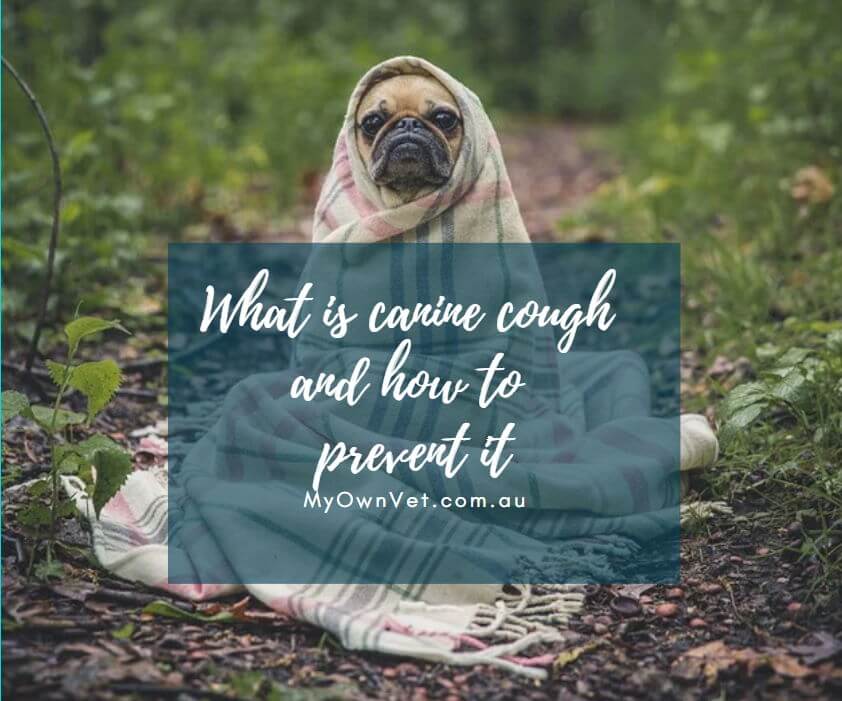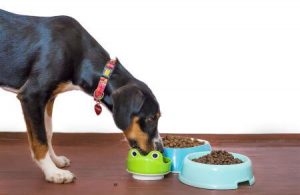What is canine cough?
Canine cough, otherwise known as kennel cough, is a contagious disease that affects a dog’s respiratory system. Canine cough is specific to dogs that is highly contagious and spreads through dog socialising such as dog shows, kennels and even obedience school classes.
Canine cough can continue for several weeks and has the potential to develop into other life-threatening problems if not treated. This condition can also be the result of exposure to dust or cigarette smoke, no matter how well the area is ventilated.
Main causes of canine cough
Canine coughs just like many viruses have different strands that can affect each dog differently. The two main causes of canine cough is the parainfluenza virus and Bordetella bronchiseptica bacteria. Dogs “contact” canine cough when they inhale bacteria or virus particles into their respiratory tract.
 What are the symptoms of canine cough:
What are the symptoms of canine cough:
- Fever or unenergetic
- Dry persistent cough
- Nasal or eye discharge
- Snorting
- Sneezing
- Gaging and vomiting
The repetitive hacking cough or dry cough will develop three to ten days after exposure. The cough can sound like a forceful cough and often sounding like a goose honk.
Canine cough is contagious. It is important that you keep them away from other animals if you think your dog might have this condition. The cough can often be set off from things like barking, pulling on the lead, or getting excited.
Canine cough can sometimes be more common in some dogs and specific breeds. If we encounter a history of this condition, we will advise you of a strategic plan to further treat or prevent this disease.
How to prevent canine cough
One of the best ways to prevent kennel cough is to limit face-to-face contact with other dogs. If you are attending dog shows precautions such as disinfection should be taken.
Disinfect kennels, bedding, and bowls after shows. During shows, it is important for handlers to wash their hands in between having contact with one dog to another.
How we treat canine cough
The most important part of prevention is to have your dog vaccinated against the disease. Vaccination will not prevent the disease entirely, but it will significantly reduce the symptoms and the duration.
We vaccinate against the two most common causes of canine cough; however, this does not mean that your dog will not catch the cough. Vaccinations will help reduce the risk of getting a canine cough, and often mild any symptoms if your dog ever contacts it.
The severity of the infection will impact how we treat it, minor symptoms do not require any medications or treatments and it will pass on its own. It is important that if you know or think your dog has a canine cough that you do not expose the infections to other dogs.
If your dog has more severe symptoms, we will prescribe medication to help with the inflammation. Dogs with pneumonia will usually require intensive care and will need to stay overnight with close observations and an IV drip.
Once your dog has recovered, we recommend a yearly canine cough booster. Although your dog will have antibodies to protect him or her from the virus, we really know which strand of the virus your dog had. Immunity to a certain strand appears to not be long-lasting, so a yearly booster will help your dog stay safer.
Conclusion
Stay aware of your pet’s health condition and make sure you have all the right steps taken in giving your dog the best care possible. Stay on top of your check-ups, and make sure you are up to date with any vaccinations.
At My OwnVet, we are more than ready to have to help your dog through any issues and prevent more problems. Call our office at 07 3277 6594 and our caring staff will schedule your pet’s next check-up!
Until next time, keep your dog healthy! We can help give your pet the best fighting chance!
Your friend and vet expert,
MyOwnVet
















 What are the symptoms of canine cough:
What are the symptoms of canine cough:





